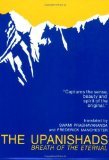More on this book
Community
Kindle Notes & Highlights
The literal meaning of upanishad, "sitting near devotedly," brings picturesquely to mind an earnest disciple learning from his teacher. The word also means "secret teaching"-secret, no doubt, because a teaching vouchsafed only to those who are spiritually ready to receive and profit by it.
Charu Uppal liked this
important characteristic arises from the fact that the Upanishads are the work of saints and seers. Their authors were concerned with reporting insights which came to them in thought or vision, not with making these insights superficially coherent. They were not builders of systems but recorders of experience.
Charu Uppal liked this
He who engages in these things attains to concentration And is no longer a slave to his passions; Devout, self-controlled, disciplined in spirit, He rises to fame and is a blessing to mankind.
The real study, say the Upanishads, is not study of themselves but study of that "by which we realize the changeless." In other words, the real study in religion is firsthand experience of God.
Charu Uppal liked this
He who sees all beings in the Self, and the Self in all beings, hates none.
To the illumined soul, the Self is all. For him who sees everywhere oneness, how can there be delusion or grief?
Charu Uppal liked this
They who devote themselves both to life in the world and to meditation, by life in the world overcome death, and by meditation achieve immortality.
He truly knows Brahman who knows him as beyond knowledge; he who thinks that he knows, knows not. The ignorant think that Brahman is known, but the wise know him to be beyond knowledge.
The ancient, effulgent being, the indwelling Spirit, subtle, deep-hidden in the lotus of the heart,
is hard tc know. But the wise man, following the path of meditation, knows him, and is freed alike from pleasure and from pain.
The Self, whose symbol is OM, is the omniscient Lord. He is not born. He does not die. He is neither cause nor effect. This Ancient One is un- borr., eternal, imperishable; though the body be destroyed, he is not killed.
The Self is not known through study of the scriptures, nor through subtlety of the intellect, nor through much learning. But by him who
longs for him is he known.' Verily unto him does the Self reveal his true being.
he who has discrimination, whose mind is steady and whose heart is pure, reaches the goal, and having reached it is born no more.
The senses of the wise man obey his mind, his mind obeys his intellect, his intellect obeys his ego, and his ego obeys the Self.
Soundless, formless, intangible, undying, tasteless, odorless, eternal, without beginning, without end, immutable, beyond nature, is the Self. Knowing him as such, one is freed from death.
Fools follow the desires of the flesh and fall into the snare of all-encompassing death; but the wise, knowing the Self as eternal, seek not the things that pass away.
What is within us is also without. What is without is also within. He who sees difference between what is within and what is without goes evermore from death to death.
If a man fails to attain Brahman before he casts off his body, he must again put on a body in the world of created things.
Above the senses is the mind. Above the mind is the intellect. Above the intellect is the ego. Above the ego is the unmanifested seed, the Primal Cause.
"Prana, the primal energy, is the sun: and Rayi, the form-giving substance, is the moon.
"Be it known that all this universe, that which is gross and that which is subtle, is one with Rayi. Therefore is Rayi omnipresent.
"The Self dwells in the lotus of the heart, whence radiate a hundred and one nerves.
"Venerable sir, if a man meditate upon the syllable OM all' his life, what shall be his reward after death?"
And the master answered him thus:
"Satyakama, OM is Brahman-both the conditioned and the unconditioned, the personal and the impersonal. By meditating upon it the wise man may attain either the one or the other.
"If he meditate upon OM with but little knowledge of its meaning, but nevertheless is enlightened thereby, upon his death he will be immediately born again on this earth, and during his new life he will be devoted to austerity, continence, and faith, and will attain to spiritual
...more
"By virtue of a little understanding of OM a man returns to earth after death. By virtue of a greater understanding he attains to the celestial sphere. By virtue of a complete understanding he learns what is known only to the seers.
there are two kinds of knowledge, the higher and the lower.
"The lower is knowledge of the Vedas (the Rik, the Sama, the Yajur, and the Atharva), and
also of phonetics, ceremonials, grammar, etymology, metre, and astronomy.
"The higher is knowledge of that by which one knows the changeless reality. By this is fully revealed to the wise that which transcends the senses, which is uncaused, which is indefinable, which has neither eyes nor ears, neither hands nor feet, which is all-pervading, subtler than the subtlest-the everlasting, the source of all.


